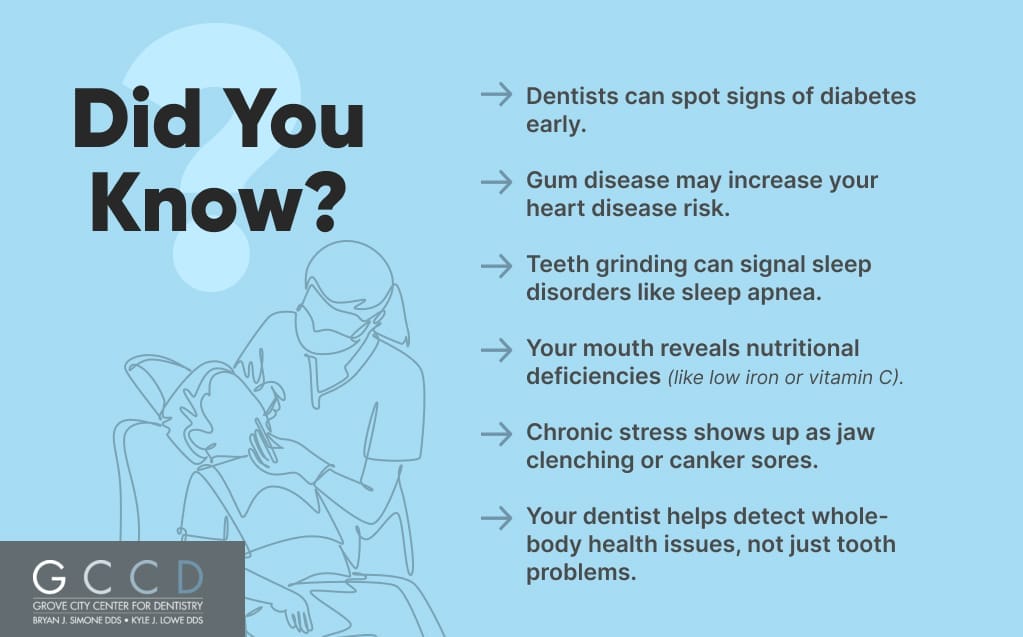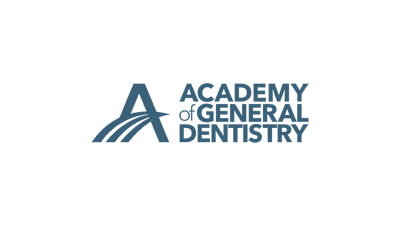You walk into your dental appointment expecting the usual routine. A cleaning, maybe a cavity check, and hopefully a good report. What you don’t expect is for your dentist to spot signs of diabetes before your doctor does.
Your mouth tells a bigger story than you might think. It’s connected to your entire body through blood vessels and tissues. When something goes wrong elsewhere, your mouth often shows the first signs. That’s why your dentist can catch health problems that seem totally unrelated to your teeth.
This isn’t some new trend in dentistry. Medical professionals have understood the mouth-body connection for years. Your regular dental visits are actually comprehensive health screenings in disguise.

What Really Happens During Your Dental Exam
Your dentist isn’t just looking for cavities during your examination. They’re checking the color of your gums. They’re examining your tongue. They’re noting how your teeth are wearing down. They’re even paying attention to your breath.
All these details matter. Your mouth is rich with blood vessels and nerve endings. Problems in other parts of your body show up here first. Plus, you see your dentist regularly. This gives them a chance to spot changes over time.
That’s why your hygienist asks about new medications. It’s why they want to know about recent health changes. They’re putting together a complete picture of your health, not just your oral health.
Related Article: Complete Guide to Cavity Prevention for All Ages

Your Gums and Your Heart Are Connected
Here’s something that surprises many patients. Gum disease and heart disease are closely linked. When your gums are inflamed and infected, that inflammation affects your cardiovascular system, too.
The bacteria causing gum problems don’t stay in your mouth. They enter your bloodstream through inflamed gum tissue. These bacteria can contribute to plaque buildup in your arteries. This is the dangerous kind of plaque that leads to heart attacks and strokes.
Research shows people with gum disease have twice the risk of heart disease. That’s a significant connection. When your dentist treats your gum disease aggressively, they’re protecting more than your teeth. They might be helping protect your heart.
The inflammation in your gums often mirrors inflammation in your blood vessels. Treating one can help improve the other. It’s a perfect example of how oral health and overall health work together.
Related Article: When Is It Too Late For Gum Grafting
How Dentists Spot Diabetes Early
Diabetes and oral health have a two-way relationship. Each condition makes the other worse. But dentists can often spot diabetes before patients know they have it:
- Slow healing after dental work: When your gums take too long to heal, it might signal blood sugar problems
- Frequent mouth infections: Recurring oral infections can indicate your body isn’t managing glucose properly
- Persistent dry mouth and thirst: These symptoms often appear together and suggest blood sugar issues
- Gum disease that won’t improve: When standard treatments don’t work, diabetes is often the hidden culprit
If you already have diabetes, you know it affects your mouth. High blood sugar makes gum disease worse. But here’s the good news. Treating gum disease can help improve your blood sugar control. It’s a beneficial cycle that helps both conditions.

Cancer Screening Happens Every Visit
Every dental examination includes oral cancer screening. Your dentist checks under your tongue. They examine your throat. They feel around your neck for swollen lymph nodes. This happens during every routine visit.
But oral cancer isn’t the only concern. Other types of cancer can show early signs in your mouth. Leukemia often causes unexplained gum bleeding. Some autoimmune conditions increase cancer risk and cause persistent mouth sores. Even distant cancers can affect your saliva or taste.
The advantage of regular dental visits is early detection. Your dentist sees many patients and knows what normal looks like. They can spot abnormal changes quickly. Any persistent sores, unusual bleeding, or tissue changes should be evaluated by a professional.
Sleep Problems Show Up in Your Mouth
Your dentist can tell a lot about your sleep quality just by examining your mouth. Sleep disorders leave distinct signs that trained professionals recognize:
- Worn-down teeth and enlarged jaw muscles: These indicate nighttime teeth grinding, often related to sleep apnea
- Tongue with scalloped edges: This pattern suggests your tongue presses against your teeth during sleep due to breathing problems
- Chronically irritated throat: This can signal mouth breathing and disrupted sleep patterns
- Frequent morning dry mouth: This often indicates breathing problems during sleep or medication effects
Sleep apnea is particularly concerning. It increases your risk of heart problems, stroke, and diabetes. When dentists notice these warning signs, they often recommend sleep studies. Many patients discover that their dental problems were actually symptoms of serious sleep disorders.
Your Teeth Reveal Nutritional Deficiencies
Your mouth serves as a report card for your nutrition. Vitamin and mineral deficiencies show up in predictable ways. Iron deficiency might cause a pale, smooth tongue. Vitamin C deficiency leads to bleeding and swollen gums. B vitamin deficiencies can cause mouth sores or a burning tongue sensation.
Dentists have identified thyroid problems through oral symptoms. They’ve spotted celiac disease and eating disorders. Since everything you eat passes through your mouth, nutritional problems often appear there first.
Your teeth don’t lie about your diet. Neither do your gums. Dental professionals can read these signs and help you understand what your body might be missing.
Stress Lives in Your Mouth
Your mouth holds stress in ways you might not realize. Dentists become skilled at recognizing stress-related oral symptoms:
- Teeth grinding and jaw clenching: Often the first physical signs of chronic stress, anxiety, or depression
- Frequent canker sores or cold sores: These typically flare during stressful periods or when immunity is low
- Declining oral hygiene: Sometimes indicates mental health challenges that make self-care difficult
- Compulsive oral habits: Cheek biting, lip picking, or excessive gum chewing can indicate anxiety
Good dentists approach these observations with sensitivity. They understand that mental health affects everything, including oral care habits. Sometimes the most helpful thing they can do is listen and connect you with appropriate resources.
Working as a Healthcare Team
The best part about these health discoveries is improved overall care coordination. When dentists spot potential health issues, they work with your other doctors. Your physician, dentist, and specialists should function as an integrated team.
This collaborative approach works best with open communication. Share your complete health history with your dental team. Mention any changes you’ve noticed, even if they seem unrelated to your teeth. The more information you provide, the better they can serve your overall health.
Don’t hesitate to mention something because it seems unimportant. In healthcare, everything connects. Your dental team wants the complete picture to give you the best care possible.
Your Next Dental Visit Matters More Than You Think
Your next dental appointment is more than a routine cleaning. It’s a comprehensive health screening by professionals trained to spot problems early. Those few minutes of examination could identify health issues before they become serious.
Regular dental visits have evolved beyond cavity prevention. They’re now essential components of preventive healthcare. They catch systemic problems early and prevent minor issues from becoming major health concerns.
Your mouth communicates constantly about your overall health. The question is whether you’re listening to what it’s saying. Don’t wait for pain or obvious problems to schedule your next visit.
Regular dental care is an investment in your complete health and well-being. The early detection is possible through routine visits, which can be life-changing. It connects you with comprehensive care when problems are most treatable.
Schedule your next appointment today. Your mouth has important things to tell you about your health.









